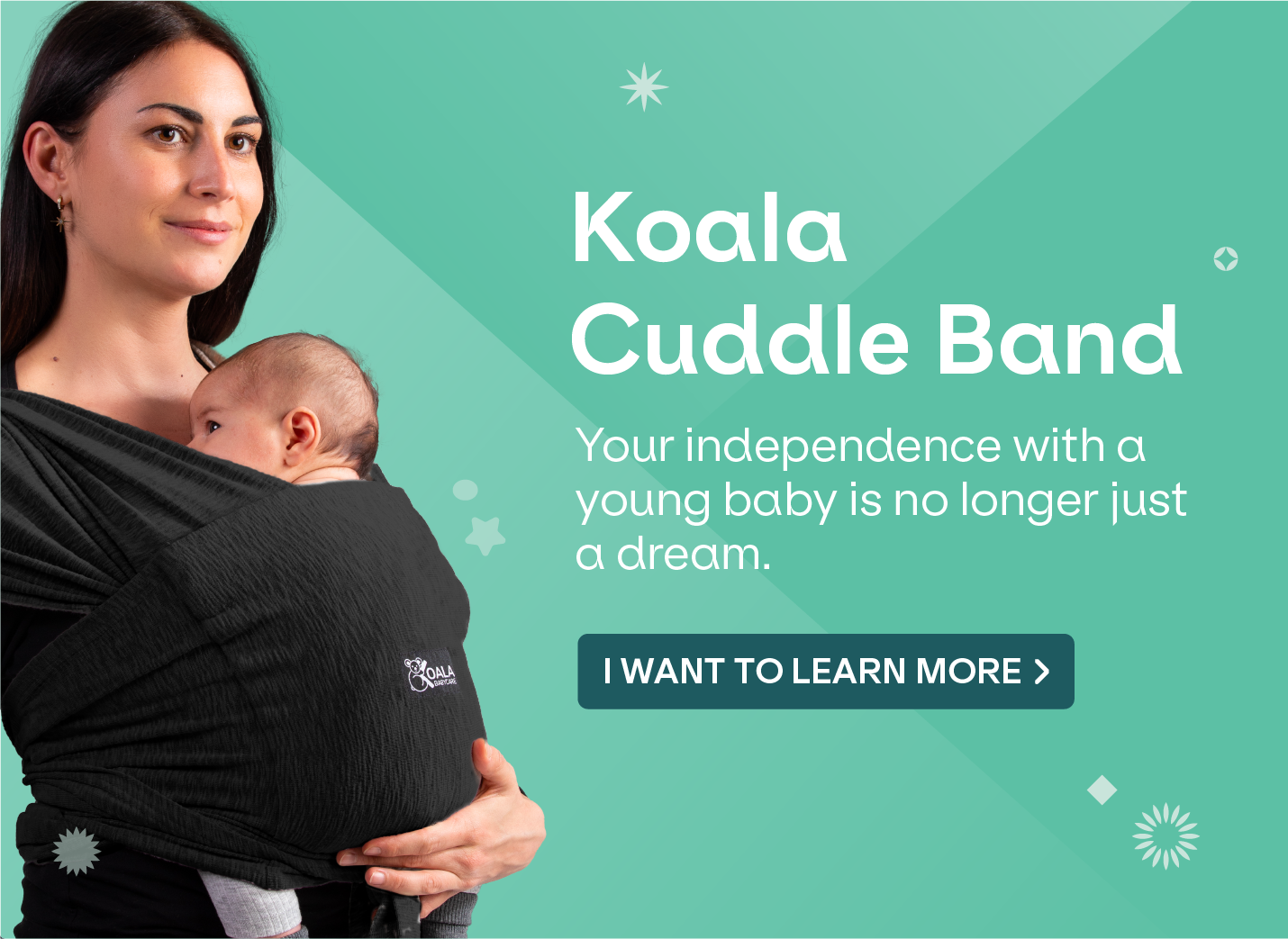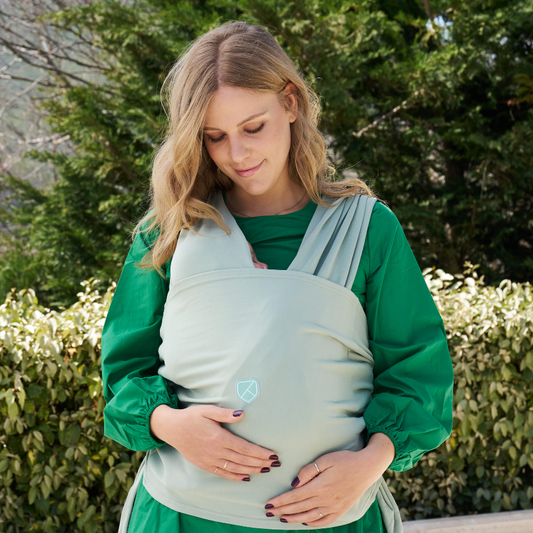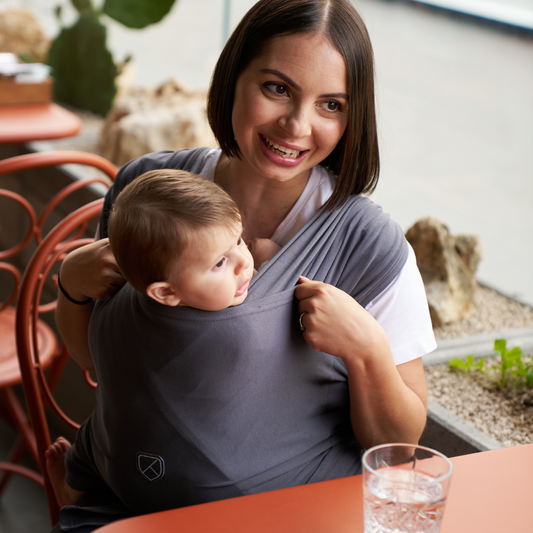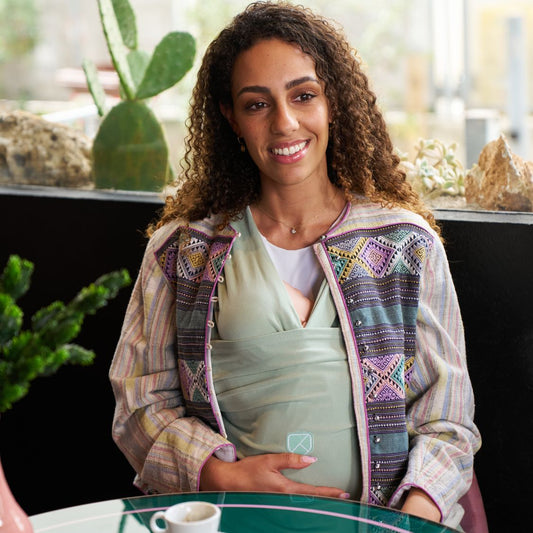There’s much more to it than just being hands-free! Babywearing has many positive effects on a baby’s psychomotor development and on the general well-being of mum and dad. We talk more about this with Dr. Chiara Colagiacomo and Federica Lavuri!
"For young infants, being carried, cradled, stroked, held, massaged, is like being fed with essential nutrients, like vitamins, minerals and proteins." Frédérick Leboyer
Babywearing is an ancient practice which consists in "carrying" babies in a sling (or other carrying support), starting from birth up until later on in childhood.
This practice offers many different benefits, both to a child’s neuro-psychomotor development and to the well-being of parents and the whole family. Let's take a look together in more detail.
Benefits for newborns, starting from the first few days of life
You can begin carrying your baby in a baby carrier, sling or wrap right from the very first few days of their life, a time when a newborn has an innate need for physical contact with their parents to recreate the protective environment they were accustomed to whilst inside their mum’s belly.
Babywearing offers many immediate benefits to both parties (the baby and the wearer). Let's take a look at them one by one.
Helps infants rediscover the same sensory stimulation they experienced whilst in the womb
Birth is a "traumatic" event that brings about an enormous change for a newborn baby, above all at a sensory level: when in utero a young infant is used to feeling each movement their mum makes and experiencing the world through her.
In the womb, they are surrounded by amniotic fluid and do not feel the force of gravity. At birth, they feel constrained by gravity, which makes movement more difficult for them.
Inside their mum’s tummy, especially during the last few months of pregnancy, a baby feels protected by the enclosed walls of her womb, and once they are born they suddenly find themselves in an unfamiliar space with an unfamiliar sensation of not having any boundaries surrounding them.
This is why babywearing provides newborns with an environment which is more similar to what they were used to pre-birth: a baby feels protected and snug in a sling, close to their mum and feels her each and every move.
Strengthens the emotional bond between parent and baby
Carrying an infant in a sling provides babies with great physical closeness.
This contact reinforces bonding, i.e., the very first emotional bond created between parent and baby, which is based essentially on sensory information (smell, touch, tonic-dialogue...).
Lays the foundation for secure attachment and healthy relationships in the future
The attachment theory, as theorised by Bowbly*, states that babies are biologically programmed to create close bonds with the people around them, primarily their parents. These bonds provide them with a high sense of security and will enable them to form relationships with other people in the future.
Carrying your baby in a sling, from day 1, enhances this primal rapport. It allows infants to be in close contact with mum or dad as well as feel safe and secure and, at the same time, helps parents to bond with their child.
The study, conducted by Lela Rankin Williams and Patricia R Turner in 2021, demonstrated how using a sling to carry your baby from their second week of life promotes a secure attachment development, even when combined with certain risk factors which could lead to an insecure or unstable attachment.
*Primary Object Clinging”, Bowlby, 1958
Benefits for older children
Children can be carried in a baby carrier up to the age of 5/6 years old. Despite the fact that benefits are greatest for infants, babywearing continues to have positive effects on both the child and the wearer as they grow.
A safe place to return to as they become independent
Babywearing can be a safe place to return to, a moment of closeness and intimacy for a baby and parent.
As you grow, a difficult challenge in itself, you always need to know that you have a safe haven where you can return to whenever you like.
Children take many steps to assert themselves and to be independent as they grow: through a process called Separation and Individuation by Margaret Mahler, which is when children learn to be individuals distinct from their caregivers.
When they start to walk, separation takes the form of physical space. They take a few steps away from us, only to experience the joy they feel of returning back to the arms of those who love them.
Creates a routine for the child
Babywearing can be become part of their routine as they develop. Children thrive with routines as they support cognitive development, as they learn and understand time, in the concept of causality. Routines help regulate them as they learn to predict what to expect.
Babywearing enables babies to experience positive emotions
Babywearing is a cuddle, and a cuddle doesn’t mean being spoilt.
On the contrary, it is very important from a relational perspective; it supports their development and enables babies to experience positive emotions.
It is, in fact, precisely these emotions which direct an infant’s actions; giving meaning to their experiences and allowing them to control their behaviour, to store and organise life experiences, to build new ones, to problem-solve and to think (Stanley, Greenspan, Wieder).
Benefits for mum and dad
Babywearing has many benefits for the wearer (mum, dad, grandparents, aunts, uncles...), first of all on a practical level, and then secondly on a relational level, as it encourages bonding with your baby by establishing non-verbal communication.
You can find baby carriers that are extremely easy-to-use, such as Koala Cuddle Band, even for those who have never used one before, meaning you can enjoy all the benefits they offer without having to deal with complicated tying methods.
Keeps your hands free
Babywearing allows you to have your hands free, and be able to carry out other activities (at home, with your other children, going for walks, shopping..) while holding your baby. Your child will love the close physical contact it offers and enjoy following your every move.
Dad can experience similar sensations to what mum felt during pregnancy
Using a baby carrier also allows dads to actively engage with newborns from day one and to experience those sensations which mum felt whilst pregnant.
It helps dads to strengthen their bond with their baby, establishing long-term habits and routines, as it sets the foundation for future development phases, maintaining continuity.
Babywearing doesn’t spoil a child, but meets a strong physiological need
For all those who, after reading this article, will be wondering "doesn't this mean I will be spoiling my son/daughter?" the answer is: absolutely not!
You cannot spoil a baby by carrying them, just as responding to your child’s cries, or holding them is not spoiling.
Babies have a physiological need for contact, contact that will help and support their neuro-psychomotor development: when we carry a baby we are responding to their strong physiological need and, in some way, nurturing it.
We’ve talked about sensory skills, attachment, routines, cuddles, and relationships: these are significant milestones for the well-being and neuro-psychomotor development of every newborn baby: babywearing is one of the most natural ways which supports all these aspects, despite not being the only one.
Mums and dads who are reading this, if you have never tried using a baby carrier, sling, or wrap, and aren’t keen on trying either, then do not worry. Experiment to find the way that suits you most and offers your baby the physical closeness they need to support their growth and development, and also helps you ease into your new "job" of being a mum or dad!
Dr. Chiara Colagiacomo & Dr. Federica Lavuri - Developmental Neuropsychomotricity Therapist










